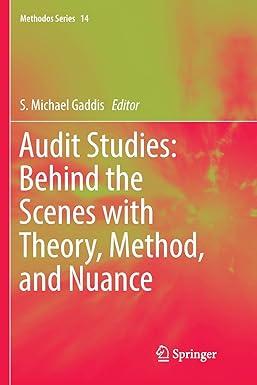Question
Henry is between jobs right now. He was most recently sing on the board of an overseas oil and gas company. However, he was underqualified
Henry is between jobs right now. He was most recently sing on the board of an overseas oil and gas company. However, he was underqualified for the position and was eventually let go. Since then, Henry has also sold some of his paintings for large sums of money. Henry feels frustrated by ongoing chatter that he has only done well in his career because of his father, who holds a prestigious position with the federal government. Fortunately, Henry has a new idea. He wants to open a computer retail and repair shop. He recently had a problem with his own laptop repair. After dropping his laptop at Erics Electronics Repair and neglecting to pick it up, Henry, unfortunately, discovered that some sensitive information about his personal life had been leaked to the press. Feeling angry about Erics lack of professionalism, Henry feels that he can open a more ethical repair shop which will compete with Eric. Henry is asking you for advice on business ethics, specifically which would apply to a computer repair business. Henry has spoken to a friend, Michelle, about this business idea and she has determined that he can feasibly sell eighty-five laptops in his first year of business at an average price of $495 per laptop. Henry has contacted a major computer manufacturer who has quoted him $1,650 for five laptops, $3,150 for ten laptops, or $29,000 for 100 laptops. Michelle also projects one-hundred-and-fifty laptop repairs in the businesss first year, with each repair priced at $95. On average, a laptop repair would cost Henry $40 in labour costs (he cant do repairs himself but is hoping he can learn over time), $10 in materials, and $5 in variable overhead costs. Michelle isnt confident projecting numbers beyond two years but thinks Henry should be able to grow sales and repair numbers by 50% in year two and at least sustain that level in the following years. Michelle has stressed that trend analysis is important. Henrys additional expenses would be $1,300 a month for rent, $350 a month for utilities, and $200 a month for advertising. Henry plans to use a combination of debt and equity financing- he plans to pay interest of $150 a month and dividends totaling $15,000 at the end of the year. Since Henry knows many wealthy businesspeople around the world (mainly through a family friend named Barack), he foresees no issues with geng money- he is planning to just call people and ask them if they want to buy shares or loan money to his new company. Henry is wondering how much money he might be able to withdraw at the end of the businesss first year- he doesnt want to withdraw any cash which wasnt technically profit. He wants you to prepare, using proper formang, a first-year projected income statement and a statement of retained earnings for him. Any insight about his projected numbers is greatly appreciated. He is especially interested in a few ratios which will help him with important decisions, so he runs a better business- he has asked for specific scenarios and explanations. Henry also wants feedback on his plan to use a combination of debt and equity financing. What is an optimal financing mix for a business like his? What specifically should he know about such a decision? Are there any benefits and drawbacks of using equity? What about debt? If the business does well, Henry might consider buying a $30,000 machine which would cut the labor cost of a laptop repair to only $15. The machine can repair an estimated 1,500 laptops before it needs to be replaced. After doing some rough math he is not confident in, Henry is wondering if he should buy the machine now instead of waiting. He is also not sure how the machine will be depreciated- he wants you to advise him on the best depreciation method for this situation and how the information will be presented on the income statement and balance sheet. Finally, Henry highly values the local indigenous community and wants to help its members, especially children. He is thinking about gathering volunteer help to produce fifty laptops to sell to a local school at cost (in the future, he hopes to donate them for free). Henry wants you to explain, in detail, how costs can be tracked for these fifty laptops, assuming some specialized workers such as supervisors are paid hourly. He also wants you to take into consideration assembly line worker costs (assuming he cant find enough volunteers), utility costs, etc. Be sure to give Henry an idea about the necessary journal entries and other important elements. Henry acknowledges that he has gone through a real struggle in his life but is dedicated to turning things around with an ethical, well-run laptop retail and repair business. In a business memo drafted by yourself (and not anyone else nor artificial intelligence) to him, give Henry detailed advice on all issues raised in the case. Feel free to add general business or life advice which may benefit Henry.
Step by Step Solution
There are 3 Steps involved in it
Step: 1

Get Instant Access to Expert-Tailored Solutions
See step-by-step solutions with expert insights and AI powered tools for academic success
Step: 2

Step: 3

Ace Your Homework with AI
Get the answers you need in no time with our AI-driven, step-by-step assistance
Get Started


